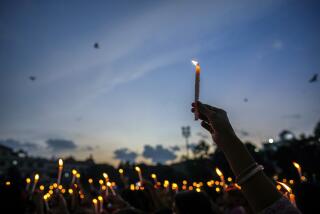Four sentenced to death in India gang-rape case
NEW DELHI -- An Indian court Friday sentenced four men to death in the December rape and murder of a 23-year-old physiotherapy student on a moving bus, one of the nation’s most closely watched legal decisions in recent history.
The judge announced the sentence in a one-paragraph statement, adding that tough punishment was justified in a case that shocked the conscience of the nation. “In these times when crime against women is on the rise, courts cannot turn a blind eye toward such gruesome crime,” said Judge Yogesh Khanna.
The victim, who died of massive internal injuries two weeks after the brutal assault, was not named under Indian law, but Indian media dubbed her “Brave Heart.”
“I welcome the judgment,” said Home Minister Sushil Kumar Shinde, adding that it was too early to comment on any possible appeal or presidential pardon. “Justice is given to Brave Heart. There cannot be any other punishment in this case.”
The four men, ages 19 to 35, were among six apprehended in the wake of an attack that hit a deep nerve in India. A fifth reportedly committed suicide in prison, although his family claimed he was murdered. The sixth, a juvenile at the time, was given three years in a rehabilitation facility, the maximum punishment.
Members of the victim’s family told reporters they were relieved at the judge’s decision but want the youngest gang member, the most brutal by some police accounts, to hang as well.
Defense attorneys countered that the decision amounted to a miscarriage of justice. “This is not the victory of truth,” A.P. Singh, a defense lawyer, yelled out when the judge read his decision, according to pool reports. “But it is the defeat of justice.”
“With grief I announce that the Delhi Court, upon the instructions of the government, ignored all the evidence and witnesses which we produced,” Singh added a few minutes later, wiping his eyes with a white napkin as he spoke to reporters outside the court.
The case sparked violent demonstrations that jarred politicians and bureaucrats into action, leading to fast-track laws, amended police procedures and a new law that stiffened penalties for gang rape and other sexual crimes. The law didn’t apply in this case because it passed after the attack.
The crime struck a chord in a country where newspapers are filled with stories of brutal gang rapes in part because of the circumstances -- the commuter bus the victim and her male friend boarded after a movie on Dec. 16 was a familiar setting to many Indians -- and because of her Indian dream story.
The victim left her village in northern Uttar Pradesh state, went to college at great sacrifice to her hardworking family, studied hard and was on track to elevate her family from poverty, a strong narrative at a time in history when millions of Indians are taking the same path.
State executions in India are reserved for “rarest of rare” cases under Supreme Court guidelines, and the vast majority of death penalty cases are commuted to life imprisonment. But social anger and cries for execution have been intense in this case. “India Demands Death,” said a headline on the NewsX television network Friday.
Outside the courtroom, demonstrators chanted for blood, both for the four convicted adults and the juvenile, who is scheduled to be released in 2015. “Hang All Rapists” said a poorly drawn black-and-red sign with a small face inside a noose. “Rape is Not a Child Play So, No Rapist Can be A Child” said another.
Nearby, a painter from northern Bihar state worked his acrylics in front of the cameras. Depicting what appeared to be a bloodied figure in white underwear, he explained that it was a Hindu god eating the souls of the convicted. Nearby, three dozen media trucks jostled for space, their roofs brimming with satellite dishes, like a forest of disembodied ears.
As execution supporters bayed their approval, death penalty critics argued that the legal decision would not have its intended effect. The death penalty “does not act as a deterrent to crimes against women, and the probability of the victims being murdered by the criminals in order to destroy evidence must not be overlooked,” the Asian Center for Human Rights said in a statement.
Since India’s last execution for rape and murder, carried out against security guard Dhananjoy Chatterjee in 2004 for attacking and killing a 14-year old in eastern West Bengal state, serious crimes including rape and kidnapping against women in the state have in fact hit an all-time high, the group said.
ALSO:
Brazilian officials seek meeting with Edward Snowden in Russia
Experts: Syrians can aid chemical weapons hunt with social media
North Korea may be restarting a nuclear reactor, U.S. institute says
Tanvi Sharma in the New Delhi bureau contributed to this report.
More to Read
Sign up for Essential California
The most important California stories and recommendations in your inbox every morning.
You may occasionally receive promotional content from the Los Angeles Times.










